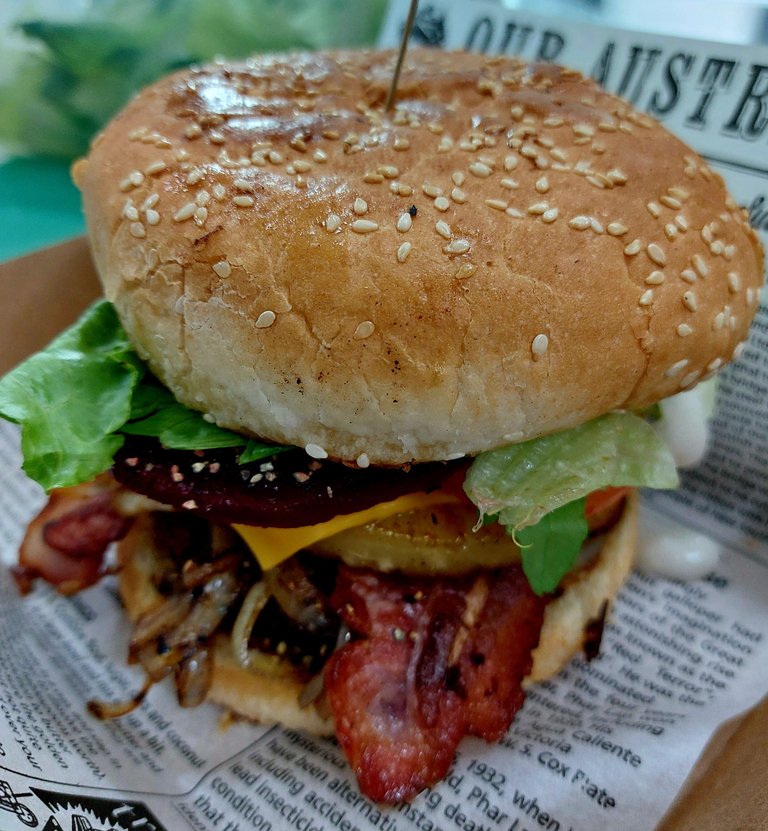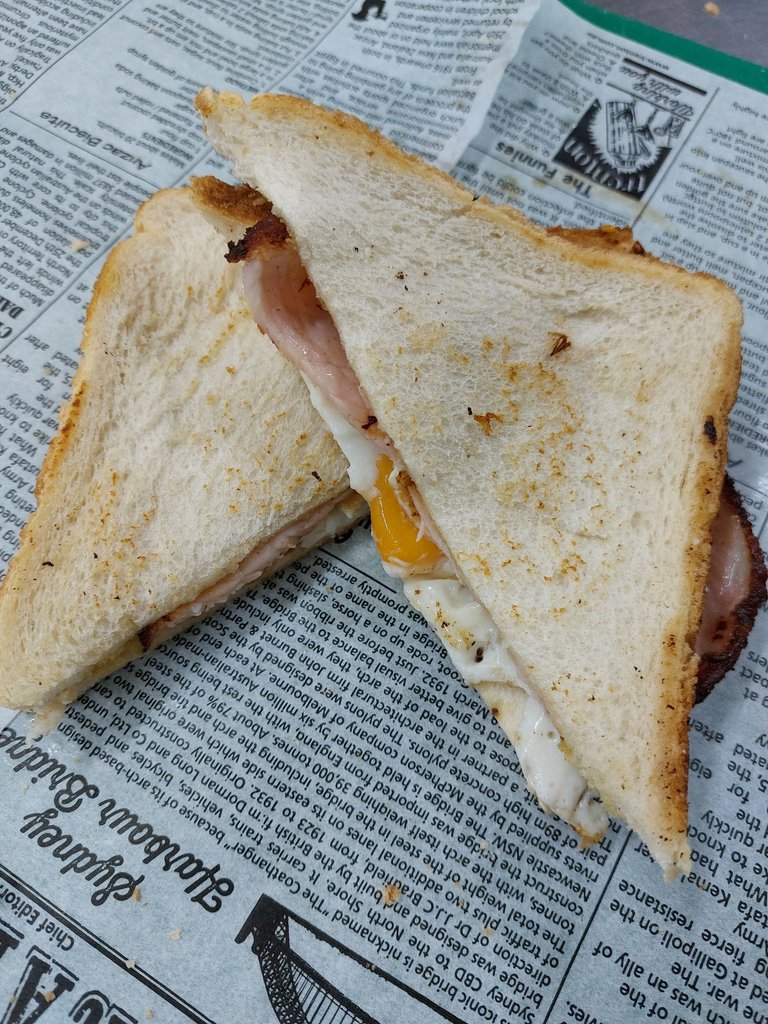Recently I had the privilege of visiting and staying in a self-sustainable community. In our modern world of "instant" it was a nice surprise to find a small hamlet of 45 people living and working together in this remote location in Australia. They provided power to the community houses through solar and diesel generators, water came from a bore and wasn't treated like most municipalities do in order to comply with State Laws. They even had a reasonable size shop where most essential groceries and items were for sale.
I truly admire this set-up as it takes time and effort to build from the ground up and gives new meaning to living and working together in an alternative lifestyle with a bunch of people. Their community shop had a great cafe attached to it where home-made goodies were on display and for sale. Burgers, pies, sandwiches, cakes, lollies, and groceries. Now I'm not shy in making my own preserves, cakes, jams or pickles but this place took it to the next level. With that I mean the next level of disaster!
Health and safety in the food industry are a big issue no matter where you live, in a city, or in a self-sufficient community. As customers ordering food or drinks from a cafe, restaurant or food van, we expect a hygienic work area and safe food to eat. For people with an autoimmune, or other compromised health issue we rely on the integrity of food handlers preparing and serving food.

Recently I observed many downfalls in the food industry in a small self-sufficient community.
It's lovely that the bread was home-made, the lettuce grown in the backyard, and the bacon was generously donated by Riley the Pig but that did not excuse the poor standard of food handling I witnessed. I was asked to observe and provide a report on the food operations of their little enterprise which consisted of a small caravan park, 4 motel units, and a cafe. They employed 3 staff, two females and one male, all in their mid to late twenties.
You may ask what the purpose of this exercise was... to simply gain insight into what was happening on ground level with the small caravan park and food industry they had set up in the hope to stop the travelling public for an hour, or overnight, and spend some money within their community.
... * So I decided to make some notes and share these with you. Sharing the entire report is not necessary as I believe anyone with their head screwed on right will understand the repercussions of the outcome.*
This read is not for the faint hearted and definitely not for those who enjoy takeaway foods on a regular basis. Food poisoning is not a joke and can kill. It's one of the highest reported cases in hospitals and doctor's practices. In the US, 48 million people suffer from food poisoning each year, roughly 130000 are hospitalised and 3000 people die each year according to the CDC. In Australia, where I am, we have roughly between 5 and 6 million cases of food poisoning each year with 80 deaths. And those are the reported cases! How many times have you or I suffered from food poisoning from a simple egg and bacon toastie and not reported it?

Anyway, below you will find a list of 54 reasons why we suffer unnecessary and miserably from food borne illnesses. I have not included all of my observations, just those that were most important to me.
54 compromised food safety issues
Food not kept under correct temperature frozen, fresh, and cooked foods.
Staff not using handwashing facilities.
Staff toilet is the same as the public and caravan park toilet across the road. No separate staff toilet. Staff doesn't wash hands.
Staff prepares food without washing hands after handling the till and money. Disposable gloves available but never used.
Chemicals cleaning products were stored next to children's lollies and chips but removed when told to do so.
Chemicals and cleaning products stored in kitchen with foods, cross contamination.
Brooms, dustpan, vacuum cleaner stored next to groceries for sale.
Use of tea towels to dry hands and same towels used for dishes.
Dishwasher is not working properly and dishes are dried with tea towels.
Fridge freezer temperatures are not recorded properly, freezers don't reach proper minus 18 or below.
Staff are not trained in safe food handling practices and often don't wash hands.
Untrained, non-skilled staff make their own pickles for sandwiches or other foods but not sterilising jars. High botulism risk as these preserves are kept and sold for weeks after making them.
No food safety supervisor on staff.
High risk foods are defrosted in the sun on kitchen sink. Frozen raw meats are not defrosted in the fridge.
Bread, butter, margarine is left in the hot kitchen all day on the bench causing it to go rancid but its still toasted and sold.
Often medications such as paracetamol, car sickness tablets, and other groceries sold for full price after best before date and/or use by date.
No double door entry from private living room residence where manager lives, entry goes straight into commercial kitchen.
Foods such as boxes of cereal stored on floor and slop-mopped around them.
Shelving is not of commercial strength and children can climb it and shelves can topple over.
Single sink in kitchen which is used for cleaning vegetables, defrosting raw meats, and mopping floors. No separate sink for cleaning floors etc.
Non potable water is used in commercial kitchen. There is zero potable water available except bottled water. Cooking using untreated bore water which is against health regulations.
No suitable cleaning or sanitising materials are used for restaurant or kitchen.
Motel units do not have own washing machine. Campers use same washing machine and driers as the motel units bedding. No commercial cleaning is done for linen from motel rooms.
No treated water in any motel room. Only bore water to shower, do your teeth etc. They provide 1 bottle of water which is inadequate.
Teabags for motel rooms tasted like soap so likely stored incorrectly with soap, shampoo or conditioner.
Hairnets not used for long hair in kitchen when preparing food for customers.
Paper towels often not available at handbasins. Cloth tea towels are used instead which are often used for drying dishes as well.
Kitchen tea towels are washed in washing machine campers just used for their dirty clothes.
They know when health inspector comes and quickly clean up.
Mops and buckets are stored on side of shop but no water point or sink available except kitchen sink.
Bleach is used to mop motel rooms. No sanitation is happening.
No commercial washing of linen for motel rooms is available.
Cross contamination of foods. Fish, chicken, red meats. No sanitation between preparing different foods.
Wrong colour cutting boards are used. Raw meat goes on white board and bread goes next. Blood is mixed with ready to eat foods.
Chuck wipes are used under cutting boards harbouring germs and causing cross contamination.
The Shire owns the roadhouse so they are their own health inspection eventhough they pay an outsider to inspect... it always gets passed.
Shire uses non-potable water everywhere. Caravan park, ablution block for showers and commercial kitchen.
No food safety supervisor is available to teach casual staff food safety rules.
Homemade potato salad was 3 weeks old and still being sold as freshly made.
Out of date milk used for coffee machine. Milk curdling in coffee.
No lid placed on deep fryer at end of day. Dust, insects or rodents can fall into the oil overnight... and they did!
Exhaust fans never switched on during cooking. Greasy walls. Fridges, freezers, air-conditioning choked up with grease hence not working properly.
Kitchen tap leaks and floods the sink and floor if not turned off at night.
Pressure trigger hose on kitchen sink tap is semi blocked from the use of bore water and is not working properly. Can't clean dishes properly.
Smoking in doorway of shop is allowed with ash trays provided at seating area out front of shop.
Coffee machine not sterilized and cleaned properly. Off milk in tubes.
Coffee machine and small milk fridge backs are exposed. Could be dangerous for kids with power cables dangling.
Staff pick up the entire half kilo sliced ham with dirty hands to peel off one slice for a toastie. Foods go rancid very quickly but is still sold.
No food safety plan. No fridge freezer temperature recording done until day before health inspection comes.
Roadhouse is always deliberately running at a loss. Selling certain items below cost price. Roadhouse receives government funding to operate.
No caravan park or motel guest register is kept.
Tobacco not stored in locked cupboard.
EPA. Rubbish dump... everything is buried. Oil, rubbish, batteries, ink cartridges, no recycling. Polluting ground and possibly underground water course.
Alcohol sold at sportsclub to groups of 50 people plus without a licence to do so.
*Hopefully you have enjoyed this read and I haven't put you off from dining out.
As self-sufficient families, farms, communities, villages we need to be vigilant and scrupulously clean in order to survive and live a healthy lifestyle. Be sensible... use water to wash, clean and continue growing and processing food to a safe standard. As this ecotrain community states:
"Changing the world starts with changing ourselves and the way we live, love, work and create together as communities"...
I am a Food Safety Supervisor among many other things with years of experience in the food industry. Thank you for reading.
Photos and written work is my own.
©️ingridontheroad